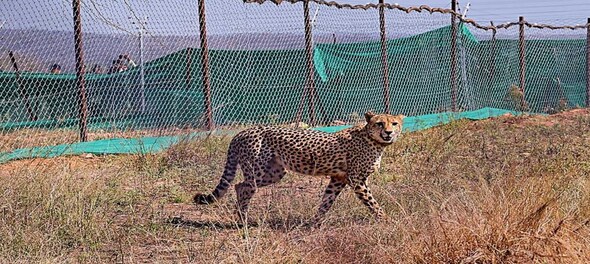
Refuting the cause of deaths of cheetahs as due to bacterial infection after maggot infestation on their necks, the Indian government has said that such reports are only speculation and not based on any scientific evidence and affirmed that all mortalities are due to natural causes.
A report in British newspaper The Independent quoted a South African expert as saying that the deaths of two African cheetahs in Kuno National Park in Madhya Pradesh last week was due to bacterial infection in their blood after a maggot infestation caused by wet skin underneath their radio collars which were not checked.
Veterinary wildlife specialist Adrian Tordiffe told the daily that the wet skin on the cheetah’s neck and underneath the collar exposed them to septicemia, a bacterial infection in the blood that originates from skin infection.
“It was clear that there was quite a lot of dermatitis, an infection of the skin below the collar. Because of the very wet weather (heavy rains), water accumulates underneath the collar and causes the skin to be constantly wet, something that wouldn’t have happened if the collar wouldn’t have been there,” Tordiffe, who is a cheetah expert on the reintroduction project, told The Independent.
“This causes dermatitis, infection of the skin, which then attracts flies to the area, these flies lay eggs and you get maggots, the fly larvae then starts feeding on the infected tissue, puncturing holes in the skin and creating wounds,” he said, adding that this led to septicemia, which would have caused the death.
The government of India responded saying as per the preliminary analysis by National Tiger Conservation Authority (NTCA), the apex body entrusted with the implementation of Project Cheetah, all mortalities are due to natural causes.
“There are reports in the media attributing these Cheetah deaths to other reasons including their radio collars etc. Such reports are not based on any scientific evidence but are speculation and hearsay.”
Of the 20 translocated Cheetahs from South Africa and Namibia, five mortalities of adult individuals have been reported from Kuno National Park, Madhya Pradesh, till date, the government said.
The statement noted that cheetahs were brought back to India after seven decades and a project of such a stature is bound to undergo ups and downs. Global experience particularly from South Africa suggests that in the initial phase of reintroduction of Cheetah in African countries has resulted in more than 50% mortality of introduced Cheetahs.
The mortality of Cheetah may happen due to intra-species fights, diseases, accidents before release and post release. Mortalities might also result from injury caused during hunting of prey, poaching, road hits, poisoning and predatory attack by other predators etc.
Considering all these eventualities the action plan has made provision for annual supplementation of initial founder population annually for managing the demographic and genetic composition of the reintroduced population.
“For investigating the cause of Cheetah deaths, consultation with international cheetah experts/ veterinary doctors from South Africa and Namibia is being done on regular basis. Further, the existing monitoring protocols, protection status, managerial inputs, veterinary facilities, training and capacity building aspects are being reviewed by independent national experts,” a PIB statement said.
The Cheetah Project Steering Committee is closely monitoring the project and has expressed satisfaction over its implementation so far.
Further, steps like establishment of Cheetah Research Center with facilities for rescue, rehabilitation, capacity building, interpretation; bringing additional forest area under administrative control of Kuno National Park for landscape level management; providing additional frontline staff; establishing Cheetah Protection Force; and creation of second home for Cheetahs in Gandhi Sagar Wildlife Sanctuary, Madhya Pradesh have been envisaged.
(Edited by : Pradeep John)
First Published: Jul 16, 2023 6:54 PM IST
Check out our in-depth Market Coverage, Business News & get real-time Stock Market Updates on CNBC-TV18. Also, Watch our channels CNBC-TV18, CNBC Awaaz and CNBC Bajar Live on-the-go!


2024 Lok Sabha Elections | What does a low voter turnout indicate for NDA and I.N.D.I.A Bloc
Apr 29, 2024 5:48 AM
'Borrowed' leaders: Congress hits out at AAP for not fielding their own candidates in Punjab
Apr 28, 2024 9:53 PM
EC asks AAP to modify election campaign song and Kejriwal's party is miffed
Apr 28, 2024 9:25 PM

